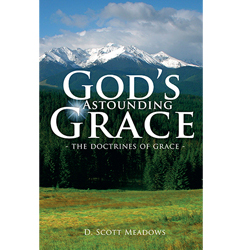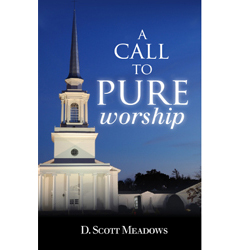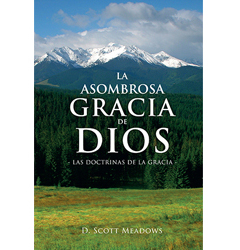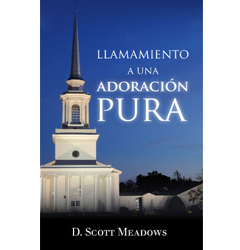

Rejoice to the Lord
D. Scott Meadows
“Rejoice in the Lord” (Phil 4.4, He is the reason/source of our joy); “to [towards] the LORD” (Psa 100)—drawing near, facing Him, serving Him, so He will see/delight in us. “The Greatest Call to Worship” (Psa 100) is a call for everyone, especially God’s elect, to rejoice and celebrate in the holy gatherings for worship. Latin title: Jubilate Deo (shout joyfully to God). Psa 100 announces truths about the LORD and stirs us to action from them. —> Theology is for doxology, doctrine is for devotion, revelation is for religion, truth is for transformation, and the gospel is for good works.
Two major truths about the LORD: 1) He is God, 2) He is Savior. Two basic actions are to follow: 1) Worship Him joyfully, 2) worship Him gratefully.
Worship the LORD our God and Savior joyfully and gratefully.
Psa title: “A psalm of praise” or confession/acknowledgement. Never are we more identifiable as God’s special people in the world than when we gather in Christ’s name to confess together before Him and acknowledge who He is (God) and what He does for us (salvation). His saving work is aimed to create our eternal ministry together of joyful, grateful praise (Rev 5.9-14).
I. The LORD Is God; Worship Him Joyfully (1-3)
3-part exhortation to us (1, 2); supporting 3-part explanation about God (3).
A. Calls to Joyful Worship (1, 2). 1a alts. “Inwardly sing ye to God” (Wycliffe, c. 1382); “O be joyful in the Lord” (Coverdale, 1535). Spurgeon: “With holy enthusiasm let us sing, making a sound which shall indicate our earnestness; with abounding joy let us lift up our voices, actuated by that happy and peaceful spirit which trustful love is sure to foster” (in loc.). 2a, such celebration is serving/ worshipping the LORD; it is to be done with gladness (great joy, pleasure), proper and possible at all times, even in coexistent sorrow because of joy’s basis in the LORD Himself (Phil 4.4, alway). 2b, alt. “Enter in his sight in full out joying” (Wycliffe). The proper way to render service to our King (Neh 2.1, 2). Beloved, rejoice greatly in gathered worship! Grumpy curmudgeons fall sinfully short of the divine expectation.\
B. Reasons for Joyful Worship (3). “All ye lands” (1a, not just Jews/ Christians). Worship because of the LORD’s true identity as God —> Creator —> Owner. 3a alt. “Be ye sure” (Coverdale). “The LORD he is God” no tautology: Israel’s Jehovah is the only true and living God (cf. Psa 96.5). Utterly distinct; He alone creates (3b) with the most profound implications for our relationship to Him. God created YOU, Christian or not, believer or not (Acts 17.24-28). Creator = ownership (3b, rights, control; Matt 20.15) of all people. However, “sheep of His pasture” (cf. 23.1) is a metaphor of His chosen people (Israel/ church), transitioning to vv. 4, 5, esp. directed to us. Also Creator of the covenant community (i.e., the Church).
What Jehovah was to old Israel, Christ is to Christians: Creator (Jn 1.1-3; cf. Col 1.16) and Shepherd (Jn 10.11), because Jesus Christ IS Jehovah. ==> Psa 100 is a call to worship Christ the Lord joyfully because He is God.
II. The LORD Is Your Savior; Worship Him Gratefully (4, 5)
Again, exhortation first (4), supporting explanation second (5).
Still a call to worship but with delightful differences: 1) to joy/singing is added thanksgiving, 2) to the LORD as God the Creator is added the LORD as God the Savior, forever good, merciful, and faithful to His people.
A. Calls to Grateful Worship (4). Under OT form (gates/courts), a call to draw near to God through Christ (the Christian’s identity and habit; Heb 7.19; 10.19-22). OT type/shadow of animal sacrifice taught sinners need the sacrifice of Christ for our approach to God (Jn 14.6). As the Lord Himself is the sacrifice and provides it, our hearty thanksgiving is the proper response. “Thanksgiving” (4a) or
confession, acknowledgement (Wycliffe) and “be thankful” or “acknowledge ye to him” (Wycliffe) as the fruit of faith is both our initial entrance (Christian conversion) and our constant recourse as habitual worshippers (Rom 10.9; 1 Tim 2.5). With grateful, believing hearts and confessing mouths, we ought to “bless his name” (alt. “speak good of,” Coverdale), where His “name” represents all that
He is and does.
So much for what we ought to do. The climax focuses on the LORD Himself and His grace toward His chosen people (i.e., gospel). This is the most powerful inducement of joyful, grateful worship from His people!
B. Reasons for Grateful Worship (5). “The LORD is good” (alt. “for sweet is the Lord,” Wycliffe). This is a statement about God in Himself (the bonitas Dei) as the Giver of all good rather than about the gifts He gives. “The very essence of His being” (Brakel), “God’s Goodness is an essential property whereby he is infinitely and of himself good, and the author and cause of all goodness in the creature” (Leigh, both cited in Muller PRRD 3.507). It is not that God is good by virtue of a standard outside Himself; goodness, by definition, is what God is. This accounts for His goodness toward us: “this supreme good, which is God, is by nature kind and bountiful . . . for He desires to impart Himself freely. For, as He is the fountain-source of all things . . . so also is He unceasingly bountiful to those whom He begot with this one purpose, that they might enjoy his bounty . . . This good is so exuberantly abundant that it is more than sufficient for the needs of all; for it is limitless and loves to impart itself” (Zwingli, ibid.). Hence, “his mercy [faithful love] is everlasting; and his truth endureth to all generations”—they must because they are the activity of the divine Being in His infinite plenitude of Goodness!
The most astounding ever display of God’s goodness, faithful love, and enduring truth, is the person and work of the Lord Jesus Christ. The bloodstained cross and the empty tomb testify with absolute eloquence! And that Savior Jesus, by His sacrifice of love, produces the grateful, joyful praise of all His people so fitting for us whom He saves by grace.
Friends, He made you, He owns you, He has an absolute right to you and your worship. Will you acknowledge Him by faith? Will you trust Him for His mercy? You should. All who do respond with joyful, grateful praise. Amen. Ω
All Rights Reserved. Used with permission. No part of this article may be used or reproduced in any manner whatsoever or translated without written permission.
The following books by D. Scott Meadows are available at Trinity Book Service and Cristianismo Histórico:
Ebook: A Call to Pure Worship | D. Scott Meadows
Ebook: God’s Astounding Grace | D. Scott Meadows




